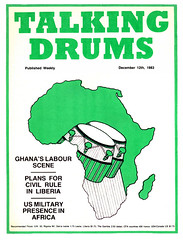Comment - What is the Alternative to Rawlings?
Part of this argument is persuasive, it goes like this: the majority of Ghanaians live in Ghana where they are not even allowed to talk about the possibility of an alternative to the regime that rules them and the Chairman of the Public Tribunals has just issued a threat to landlords in whose houses there will be anti Provisional National Defence Council talk - not only will the houses be confiscated, the landlords will be prosecuted. In other words, the landlord need never be part of the anti-PNDC talk, once such talk is conducted in a building he owns, he runs a risk of losing his house and/or ending up in jail. How then can anybody expect the majority of Ghanaians to debate an alternative to Rawlings even if somebody should dare announce such a programme?
In other words, WHERE will such a public debate be conducted? All the public arena for debate in Ghana currently come under the firm control of the ruling PNDC who are operating from the premise that there is and should be no alternative to them, they will therefore obviously not tolerate a debate that starts from the premise that there is an alternative to them.
The other part of the argument is not quite as persuasive, but also has obvious merits, and that emphasizes the fact that it is a particularly tricky search at all. business talking about wanting to replace a regime in power no matter how oppressive or repugnant such a regime. The law, always on the side of power, seems to be that you are wrong until you have succeeded in overthrowing the regime. Therefore the argument goes, if there are people who are indeed thinking of and planning towards the violent overthrow of the regime, leave them to accomplish that task and then they will announce their programme. If anybody announces an alternative programme to Rawlings such a person or group of people will immediately be identified as an enemy to the regime and will run grave risks to life.
There is definitely a problem about alternatives in a situation where change is not allowed and the very concept of difference is frowned upon. Nobody will consider the British Labour Party's alternative programme for governing the United Kingdom as subversive, nor will the fact that the United States Democratic Party wants a programme totally different from President Reagan's be deemed as unacceptable. On the contrary, the Labour Party and Democratic Party in both countries are anxious to let as many people as possible in their countries know their programmes and debate them.
In the court of World Opinion, there can be no difficulty about offering for comparison an alternative suggestion to any state of affairs. Flt-Lt Rawlings himself, during the Limann regime, used to quote President J. F. Kennedy (because he claimed he would be misunderstood if he quoted Fidel Castro) that those who make peaceful change impossible, make violent change inevitable. By asserting that there should be nothing but the PNDC, the Flight-Lieutenant himself has accepted that violent change is inevitable. But beyond the concept of violent change and its merits and demerits, there is currently nothing else on offer to the people of Ghana and anybody who laments the goings-on in Ghana will necessarily have to face up to the question: what is the alternative?
The idea that the country has to wait until Rawlings and his PNDC are no more to learn what the alternative to the current regime is, smacks of the same arrogance that the PNDC is displaying.
It would of course be ideal, if it were possible for alternative programmes to the PNDC to be publicly and quietly debated in Ghana on the radio, in newspapers, on the television and at lectures and symposia. Civilised communities are forever searching for alternatives to whatever they have and alternative methods to doing things, they are never satisfied with whatever they have. It is this search for alternatives that put men on the moon, that is how men came to fly in aeroplanes at all and that is how come many diseases have been eradicated in the world. If this search for an alternative cannot be conducted openly and in a dignified manner inside Ghana, it is a defeatist attitude to suggest that the result should be no.
We wish to offer the very modest columns of 'Talking Drums' for such a debate. It might very well be that Ghanaians will discover that among the various groups seeking to replace Rawlings, their understanding of 'democracy' is as different as the understanding of that word between East and West Germany.
What is more, there is no reason why the search and articulation of an alternative to the PNDC need be restricted only to those who are engaged in overt or covert activities aimed at overthrowing the regime. There surely must be many Ghanaians who have not declared any opposition to the PNDC and yet have ideas on how they believe Ghana can best be run. There must be others who find some actions of the PNDC repugnant and attractive and who might have a package that included some of their actions very the pluses of the PNDC without their minuses.
The problem of a time-table as has been shown, also plays a critical part in the attempt to return a country to a constitutionally elected government and so does interim administrations, their make-up and the length of time they function. We believe that all these are matters worth discussing and we welcome views on the subject including views that might show that we are jumping the gun.
